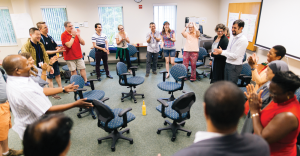
Rosemarie Bello Truland, a lawyer who teaches sociology at Brookdale Community College in New Jersey, found inspiration at the 2017 Summer Peacebuilding Institute (SPI) in the restorative justice and community organizing class.
She saw a man who had served 25 years in prison sitting next to a retired police commander, “both having come to recognize the importance of acceptance of responsibility on the part of a ‘perpetrator’ and of forgiveness on the part of the ‘victim’ and the community.”
“The people I met have solidified my commitment to action,” Truland said. “In the end, I did not want to leave this campus and this community. The experience brought me such peace and such connection and restored my faith in the power of love, forgiveness and reconciliation.”
Truland plans to integrate restorative justice into the gender studies courses she teaches, to design introductory programs for criminal justice students, and to network with a classmate who works with victims of domestic violence.
Livia Griffith, a director of information technology at nearby James Madison University (JMU), came to the same SPI course after a deeply scarring experience with the U.S. criminal justice system. Five days later, with “renewed hope for transformation of a broken system,” she plans to volunteer with JMU’s Office of Student Accountability and Restorative Practices (directed by Josh Bacon GC ’11). This fall, she also began taking classes towards a graduate certificate in restorative justice at EMU with the goal of “building a community of like-minded individuals to transform the criminal justice system in my community.”
The skills taught for 22 years at SPI have always been relevant to people in the United States, says SPI director Bill Goldberg MA ’01, but now they have a renewed significance in the serious challenges the country faces.
“We have 22 years of experience helping people work for justice, peace and good governance in places where governing systems are not working well and where people are in conflict,” Goldberg said. “If we want a world that is built on peace with justice, we need to work effectively, without the expectation of government support, at the community, local and regional levels in every country, including our own.”
New offerings at SPI in 2017 included four courses that directly addressed how to manage and transform divisive rhetoric and communication; how to bring polarized communities together and organize for change; and how to recognize and analyze systems of oppression.
These courses attracted 54 students (out of 175) from around the United States, as well as global peacebuilders seeking to make progress on similar issues.
Griffith says the presence of so many motivated individuals, all seeking positive change and bringing their own experiences and knowledge, primed her own “restoration.”
That’s what Goldberg hopes to hear in the coming months from U.S. peacebuilders who attended SPI and now continue to work at transformation of their relationships, communities and organizations.
“We intend to bring this same focus to next year’s SPI, with courses that provide long-term solutions and new skills for anyone across the political spectrum who is motivated to political and social action,” he said. “Let us know what you’d like to learn more about.”